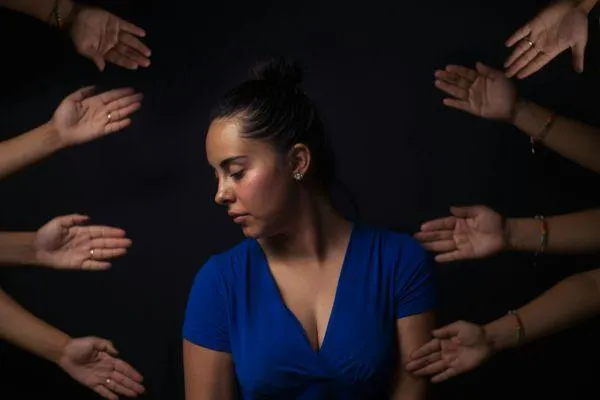
When to Seek Help for Anxiety and Finding Your Path to Healing
The Anxiety and Depression Association of America has reported that only about a third of those who have anxiety disorders get proper treatment.
This could be because of many factors, including not knowing when and how to seek help.
Noticing signs of anxiety, knowing how to seek help, and getting the help you need are key to dealing with and improving symptoms of anxiety.
This post may contain affiliate links. Read my full disclosure to learn more.
When To Seek Help For Anxiety
Your Work is Suffering
When your anxiety is causing you to miss multiple days of work, constantly show up late, and miss important deadlines, this is a sign that you need professional help with your anxiety.
Difficulty completing typical work tasks, such as sending out emails or showing up to meetings, are also signs that your anxiety is more severe than you may realize.
"Commit your work to the Lord, and your plans will be established." (Proverbs 16:3, ESV).
Trusting God with your work and seeking His guidance can help you recognize when anxiety is affecting your job, prompting you to seek the help you need.
Your Relationships Are Not Working
Another sign that you may need help with your anxiety is when it affects your family, friends, and significant other relationships.
Avoiding friends and family or being overly jealous and constantly worrying about your partner are common signs that anxiety is affecting your relationships.
If they have ever told you that the way you are acting is affecting them, especially if more than one person has said something, consider speaking to a professional.
"Therefore encourage one another and build one another up, just as you are doing." (1 Thessalonians 5:11, ESV).
Encouraging and building each other up in relationships is crucial. Recognizing when anxiety gets in the way allows you to seek help and restore healthy interactions.
You Are Self Medicating
Self-medicating with drugs, alcohol, or food is a sign you are trying to avoid or suppress the feelings of anxiety. Certain marijuana strains, alcohol, and other drugs (and even food) may seem to suppress your feelings, but can make symptoms worse later down the road.
Not only that, using drugs can lead to a serious dependency, causing more problems down the road and can even be life-threatening. Using food as a drug can lead to obesity and other health problems.
"Or do you not know that your body is a temple of the Holy Spirit within you, whom you have from God? You are not your own," (1 Corinthians 6:19).
Our bodies are temples of the Holy Spirit, and self-medicating with harmful substances shows we need professional help to care for our bodies as God intends.
Worrying to The Point of Exhaustion
Are you noticing you are not getting enough sleep because the worries are constantly being replayed in your brain over and over as if they are on a repeat recording?
If you constantly worry about every little thing you did, you said, or someone else did or said, and replay it in your head until you're exhausted, it's a sign that your anxiety is out of control, and you need to seek help.
"Come to me, all who labor and are heavy laden, and I will give you rest." (Matthew 11:28, ESV).
Jesus invites those who are weary and burdened to come to Him for rest. Seeking help for anxiety aligns with this invitation to find peace and relief.
It Prevents You from Performing Every Day Essential Tasks
If you won't leave your house for much-needed groceries, you can't get out of bed to take a shower, or you are missing out on life because you feel trapped, isolated, and fearful daily, this is a serious problem.
Activities that you once found entertaining but are no longer enjoyable are another sign that you need help.
" The Lord is my light and my salvation; whom shall I fear? The Lord is the stronghold of my life; of whom shall I be afraid?" (Psalm 27:1, ESV).
God is our light and stronghold, and when anxiety prevents us from living our lives, we need to seek help to overcome these fears and embrace His strength.
You Experience Panic Attacks
If you experience multiple panic attacks, then it is time for you to seek help. Panic attacks can debilitate and overwhelm, leading to isolation. Panic attacks are commonly linked to anxiety disorders and can be treated.
While it can be hard when you have anxiety to get the help you need once you do it, you'll start improving fast.
" When the cares of my heart are many, your consolations cheer my soul." (Psalm 94:19, ESV).
God's consolation brings joy to our anxiety. Seeking professional help for panic attacks allows you to experience His comfort and find relief.
How and Where to Seek Help
Support Groups
The Anxiety and Depression Association of America has an anonymous peer-to-peer online anxiety and depression support group. Members can connect with others who have anxiety, depression, and other related disorders as well as ask questions.
Facebook is also a source of private support groups that are there for anyone who wants to talk or see how others are coping without talking face-to-face with anyone.
"Bear one another's burdens, and so fulfill the law of Christ." (Galatians 6:2, ESV)
Support groups allow us to carry each other's burdens, fulfilling Christ's law of love and support in times of need.
Friends and Family
It may seem challenging to speak to friends and family about your anxiety, but doing that can be a great way to work through your problems. Friends and family are there to help as they love you and only want the best for you.
But some of them may not really understand that you cannot just pull yourself out of it, so if you find this to be an unsatisfactory way to feel better, seek outside help but still be open with your friends and family about your situation.
" A friend loves at all times, and a brother is born for adversity." (Proverbs 17:17, ESV).
Friends and family will always love and support us, especially during difficult times. Leaning on them can provide comfort and strength.
Get Therapy
Therapy is a great way to work through anxiety. There are many types of therapies, from private one-on-one sessions to group therapy.
Cognitive-Behavioral Therapy is a common treatment that focuses on identifying, understanding, and changing your thinking and behavior patterns. CBT is best for those who want to be more active and have control of their recovery.
If you are concerned that you may have GAD, even if you think it's mild, it won't hurt to seek help, even though initially it is hard to take those steps.
Realize that the anxiety will often make us think we don't really need help even when we do. They say that the healthiest people are the ones who seek help even when it's hard to do. Take that first step and reach out for that lifeline, and you won't regret it.
" The purpose in a man's heart is like deep water, but a man of understanding will draw it out." (Proverbs 20:5, ESV).
Therapists help draw out the deep waters of our hearts, providing insight and strategies to overcome anxiety through professional guidance.
Cope with anxiety - download your free worksheets!
Support Lines
If you find yourself in crisis or suicidal, call the Suicide Prevention Lifeline at 1-800-273-8255 or text the Crisis Text Line at 741-741 to get help.
" The Lord is near to the brokenhearted and saves the crushed in spirit." (Psalm 34:18, ESV).
In times of crisis, God is close to the brokenhearted. Reaching out to support lines provides immediate help and aligns with God's care for the crushed in spirit.
Take that first step and reach out for that lifeline, and you won't regret it.
Don't miss out on the latest updates
© 2026 Earthly to Heavenly | Powered by Freedomkit.ai

